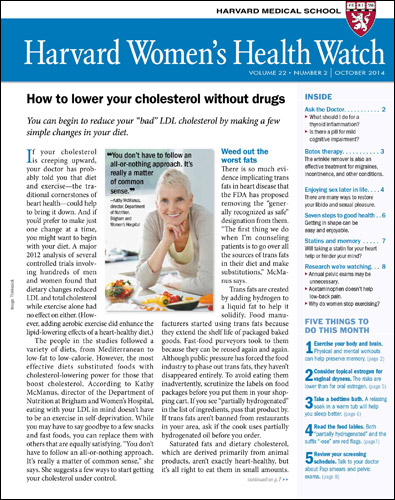Harvard Health Blog
Expert panel says healthy women don’t need yearly pelvic exam

ARCHIVED CONTENT: As a service to our readers, Harvard Health Publishing provides access to our library of archived content. Please note the date each article was posted or last reviewed. No content on this site, regardless of date, should ever be used as a substitute for direct medical advice from your doctor or other qualified clinician.
The annual pelvic exam, an oft-dreaded part of preventive care for women, may become the as-needed pelvic exam, thanks to new guidelines from the American College of Physicians.
As part of a pelvic exam, a doctor uses a tool called a speculum to look at the vagina and cervix. She or he also inserts two fingers in the vagina and places her or his other hand on the outside of the stomach. The exam lets the doctor examine the cervix, uterus, and both side of the lower abdomen where the ovaries and Fallopian tubes are located.
For decades, doctors have believed this exam may detect problems like ovarian cancer or a bacterial infection even if a woman had no symptoms. And sometimes it does. But recently experts have questioned whether the yearly ritual adds value to a woman’s health.
In the new guidelines, published in the Annals of Internal Medicine, an expert panel appointed by the American College of Physicians recommends that healthy, low-risk women not have routine annual pelvic exams. The panel based this advice on a systematic review of prior studies. They not only found no benefit from the annual pelvic exam, they found that it often causes discomfort and distress. Sometimes it also leads to surgery that is not needed.
The new guidelines only apply to the pelvic exam, and only in healthy women. The panel urged women to keep getting checked for cervical cancer. Also, the experts emphasized that pelvic exams remain a necessary part of the evaluation in any woman with symptoms that could be related to a problem with the vagina, cervix, uterus, Fallopian tubes, or ovaries.
It’s also important to note that the American College of Obstetricians and Gynecologists still recommends a yearly pelvic exam for women, even though it acknowledges that the evidence does not support or refute its value.
Mixed feelings
Phasing out the annual pelvic exam mirrors a similar change for men. Doctors once routinely did rectal exams to check the prostate gland, a common site of cancer in men. But evidence that it isn’t a very effective way to detect prostate cancer, and may have caused more harm than good (sound familiar?) led experts to recommend against it being done every year.
I have to admit that as a doctor and as a man, I was happy about that change. I called a couple of my female physician colleagues to get their personal and professional reactions to the news about phasing out routine pelvic exams. Question: “Will you miss not having regular pelvic exams?” Response (paraphrased): “Are you serious? No way will I miss them!”
We did agree, though, that some women will feel that their annual check-up is not complete without a pelvic exam, just as some men do about the rectal exam. And some doctors will find it difficult to stop doing these exams, since they learned these rituals in medical school and were told they were beneficial.
A test women do need
Although seemingly healthy women may not need a pelvic exam every years, being tested regularly for cervical cancer can save a woman’s life. Here are the recommendations for women at average risk of cervical cancer:
- ages 21 to 29: a Pap smear once every 3 years.
- ages 30 to 65: a Pap smear every 3 years or a combination of a Pap smear and HPV test every 5 years.
- over age 65: routine Pap screening not needed if recent tests have been normal.
Keep in mind that these are guidelines. For personal reasons, you and your doctor may wish to choose HPV testing first or have more frequent Pap smears than recommended.
If during a routine appointment your doctor wants to perform a pelvic exam, and you aren’t keen on the idea, feel free to ask why you need it and what he or she is looking for. That’s not a challenge. Based on current evidence, there should be a reason for doing a routine pelvic exam.
About the Author

Howard E. LeWine, MD, Chief Medical Editor, Harvard Health Publishing; Editorial Advisory Board Member, Harvard Health Publishing
Disclaimer:
As a service to our readers, Harvard Health Publishing provides access to our library of archived content. Please note the date of last review or update on all articles.
No content on this site, regardless of date, should ever be used as a substitute for direct medical advice from your doctor or other qualified clinician.
















